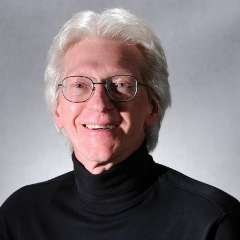Season openers in Prague are usually predictable affairs, with a staple from the durable Czech opera repertoire showcasing homegrown talent and satisfying local tastes. Which makes this yearʼs choice, unusual in any circumstances, a particularly bold stroke: a double bill of Carl Orffʼs Die Kluge (The Wise Woman) and Der Mond (The Moon), both updated treatments of lesser-known Grimm Brothers fairy tales. Director Jiří Nekvasil has pushed them even further into the modern world, unleashing one of the wildest nights at the National Theatre since the Beast got loose in a 2003 production of Philip Glassʼs La Belle et la Bête.
For the first half hour or so, Die Kluge unfolds in standard fashion. To save her father from imprisonment in the castle dungeon, a clever girl must answer three riddles put to her by the king. Dizzying op-art sets and whimsical, playing card-inspired costumes help to create a fantasyland where it seems perfectly natural and charming for Jana Sibera not only to solve Roman Janálʼs riddles, but to win his affections and become his bride. Great movement work by six mimes adds dynamism to an otherwise static scenario, and sharp work by conductor Zbyněk Müller with a minimalist score sets a riveting pace.
Suddenly all the house lights go up, and three men in contemporary business suits take the stage, brandishing mobile phones and talking trash. These are the vagabonds, characters Orff added to the story as Shakespearean foils, transformed by Nekvasil into unscrupulous “lobbyists” looking for any way to make a quick profit. Itʼs a jarring intrusion of reality made even more perplexing by the abrupt loss of surtitles (unreadable in the bright light). As it turns out, the vagabonds have some of the strongest musical segments in the opera, and Václav Lemberk, Radek Pokorný and Jiří Hájek (with an occasional assist from a mule owner, Jiří Rajniš) do a superb job of bringing to life the German vocal ensembles of the 1920s and ʼ30s that provided the inspiration for the music.
But by the time the vagabonds are fully integrated into the remainder of the story and their comic relief is spent, the spell is broken and the worlds of enchantment and exploitation remain an uncomfortable juxtaposition rather than a fresh, revealing fit.
Der Mond is a minor miracle, if you happen to be deeply schooled in Central European communism. Nekvasil announces the new setting for the story on a mammoth television screen that descends before a group of pajama-clad children in the opening scene. A vintage test pattern fades to the title DER MOND DER DDR – The Moon of the German Democratic Republic, a nostalgic return to East Germany during the Cold War. The screen rises to reveal a Trabant, the first of many beloved icons from the bad old days.
Four men in ʼ70s-era haircuts and clothes emerge from the car and decide to steal the moon from a resort area where theyʼre vacationing and bring it to their village, which has no moon. Many years later, when they die, each takes a quarter of the moon to the grave with him, awakening denizens of the underworld who crawl out of their graves and party like itʼs 1989. Eventually St. Peter has to come down from heaven to send everyone back to their graves and hang the moon in the sky, where it belongs.
The story is narrated by a singer (Jaroslav Březina) in a surreal, giant-headed elf costume – Sandmännchen, an enormously popular TV puppet character. When the graves open up, other communist-era characters pop out: Maya the Bee, Winnetou the Indian, political puppets Walter Ulbricht and Erich Honecker and other figures lifted from authentic clips shown periodically on the TV screen. By the time St. Peter (in a flowing white robe with a lamb clamped permanently around his shoulders) shows up to stop the party, dancing showgirls are leading a chorus line across an apron that extends into the audience, with raucous support from the orchestra.
Itʼs ridiculous, itʼs sublime, and if you donʼt know the references, utterly baffling. The audience at the premiere did, laughing immediately at the Trabant and enjoying every wink, nod and red elbow in the ribs throughout the remainder of the evening. As an additional incentive to locals who might not otherwise attend an obscure Orff double bill, both operas are performed in Czech, adding another layer of inscrutability for foreigners.
For all that, this is a production worth seeing, if for no other reason that to hear the music, some of it 50 years ahead of its time and all of it characterized by lively, inventive orchestration. Granted, everything else is a largely a convoluted history lesson. But history never went down so easy.




